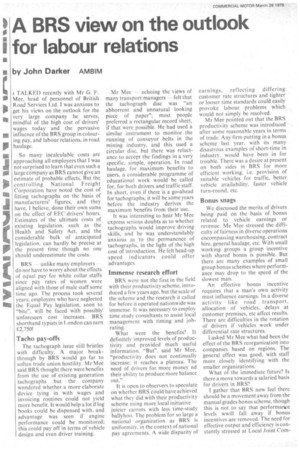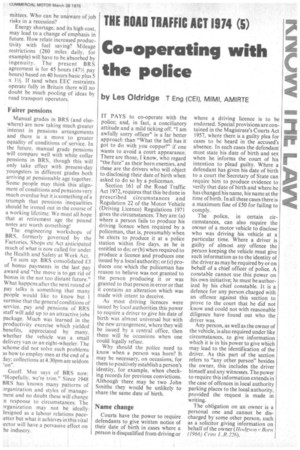A BRS view on the outlook for labour relations
Page 46

Page 47

If you've noticed an error in this article please click here to report it so we can fix it.
by John Darker AMBIM t TALKED recently with Mr G. F. Mee, head of personnel of British Road Services Ltd. I was anxious to get his views on the outlook for the very large company he serves, mindful of the high cost of drivers' wages today and the pervasive influence of the BRS group in colouring pay, and labour relations, in road haulage.
So many incalculable costs are approaching all employers that I was not surprised to learn that even such a large company as BRS cannot give an estimate of probable effects. But the controlling National Freight Corporation have noted the cost of fitting tachographs on the basis of manufacturers' figures, and they have, I believe, done their own sums on the effect of EEC drivers' hours. Estimates of the ultimate costs of existing legislation, such as the Health and Safety Act, and the considerable bulk of anticipated legislation, can hardly be precise at the present time though no one should underestimate the costs.
BRS unlike many employers do not have to worry about the effects of equal pay for white collar staffs since pay rates of women were aligned with those of male staff some time ago. The process took several years; employers who have neglected the Equal Pay legislation, soon to "bite", will be faced with possibly' unforeseen cost increases. BRS shorthand typists in London can earn £2,750!
Tacho pay-offs
The tachograph issue still bristles with difficulty. A major breakthrough by BRS would go far to soften trade union hostility. Mr Mee said BRS thought there were benefits from the use of existing generation tachographs but the company wondered whether a more elaborate device tying in with wages and invoicing routines could not yield more benefit. It would help a lot if log books could be dispensed with, and advantage was seen if engine performance could be monitored; this could pay off in terms of vehicle design and even driver training. Mr Mee — echoing the views of many transport managers — felt that the tachograph disc was "an abhorrent and unnatural looking piece of paper"; most people preferred a rectangular record sheet, if that were possible. He had used a similar instrument to monitor the running of conveyor belts in the mining industry, and this used a circular disc, but there was reluctance to accept the findings in a very specific, simple, operation. In road haulage, for maximum benefits to users, a considerable programme of educational work would be called for, for both drivers and traffic staff. In short, even if there is a go-ahead for tachographs, it will be some years before the industry derives the maximum benefits from their use.
It was interesting to hear Mr Mee express serious doubts as to whether tachographs would improve driving skills, and he was understandably anxious as to the permanence of tachographs, in the light of the high cost of introduction. He felt head-up speed indicators could offer advantages.
Immense research effort
BRS were not the first in the field with their productivity scheme, introduced a few years ago, but the scale of the scheme and the research it called for before it operated nationwide was immense. It was necessary to employ time study consultants to assist local management with timing and jobrating.
What were the benefits? It definitely improved levels of productivity and provided much useful information. "But", said Mr Mee, "productivity does not continually increase; it reaches a plateau. The need of drivers for more money nd their ability to produce more balance out."
It is open to observers to speculate on whether BRS could have achieved what they did with their productivity scheme using more local initiative juicier carrots with less time-study ballyhoo. The problem for so large a national organization as BRS is uniformity, in the context of national pay agreements. A wide disparity of earnings, reflecting differing customer rate structures and tighter or looser time standards could easily provoke labour problems which would not simply be resolved.
Mr Mee pointed out that the BRS productivity scheme was introduced after some reasonable years in terms of trade. Any firm putting in a bonus scheme last year, with its many disastrous examples of short-time in industry, would have been in for trouble. There was a desire at present on both sides in BRS for more efficient working, i.e. provision of suitable vehicles for traffic, better vehicle availability, faster vehicle turn-round, etc.
Bonus snags
We discussed the merits of drivers being paid on the basis of bonus related to vehicle earnings or revenue. Me Mee stressed the difficulty of fairness in diverse operations encompassing warehousing, contract hire, general haulage, etc. With small working groups a group incentive with shared bonus is possible. But there are many examples of small group bonus schemes where performance may drop to the speed of the slowest man.
An effective bonus incentive requires that a man's own activity must influence earnings. In a diverse activity like road transport, allocation of vehicles, delays at customer 'premises, etc affect results. There are difficulties in the rotation of drivers if vehicles work under differential rate structures.
I asked Mr Mee what had been the effect of the BRS reorganization into companies based on regions. The general effect was good, with staff more closely identifying with the smaller organizations.
What of the immediate future? Is there a move towards a salaried basis for drivers in BRS?
I gather that BRS now feel there should be a movement away from the manual grades bonus scheme, though this is not to say that performan,ce levels wwill fall away if bonus incentives are removed. The need for effective output and efficiency is constantly stressed at Local Joint Corn mittees. Who can be unaware of job risks in a recession?
Energy shortage, and its high cost, may lead to a change of emphasis in future. How relate increased productivity with fuel saving? Mileage restrictions (280 miles daily, for example) will have to be absorbed by ingenuity. The present BRS agreement is for 45 hours (471/2 pay hours) based on 40 hours basic plus 5 x 11/2. If tand when EEC restraints operate fully in Britain there will no doubt be much pooling of ideas by road transport operators.
Fairer pensions
Manual grades in BRS (and elsewhere) are now taking much greater interest in pensions arrangements and there is a move to greater equality of conditions of service. In the future, manual grade pensions will compare well with white collar pensions in BRS, though this will only take effect with present-day youngsters in different grades both arriving at pensionable age together. Some people may think this alignment of conditions and pensions very much overdue but it is something of a triumph that pensions inequalities should be ironed out in the course of a working lifetime. We must all hope that at retiremtnt age the pound notes are worth something!
The engineering workshops of BRS, formerly governed by the Factories. Shops etc Act anticipated much of what is now called for under the Health and Safety at Work Act.
To sum up: BRS consolidated .E3 of bonus payments in the last pay award and "the move is to get rid of bonus in the not too distant future." What happens after the next round of pay talks is something that many people would like to know but I surmise that the general conditions of service, pay and pensions of BRS staff will add up to an attractive jobs package. Much was learned in the productivity exercise which yielded benefits, appreciated by many, whether the vehicle was a small delivery van or an eight-wheeler. The scheme did not solve such problems as how to employ men at the end of a Jay; collections at 4.30pm are seldom 'on".
Geoff. Mee says of BRS now: 'Hopefully we're trim." Since 1948 BRS has known many patterns of Drganization and styles of management and no doubt these will change n response to circumstances. The )rganization may not be ideally. Iesigned as a labour relations pacettter but what it achieves in this vital :ector will have a pervasive effect on he industry.




























































































